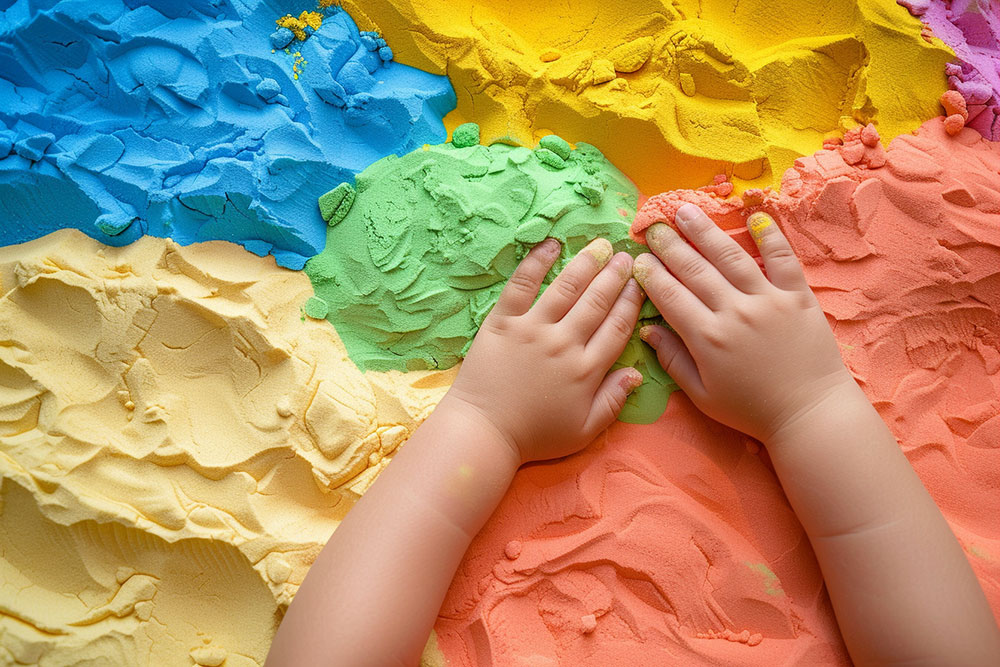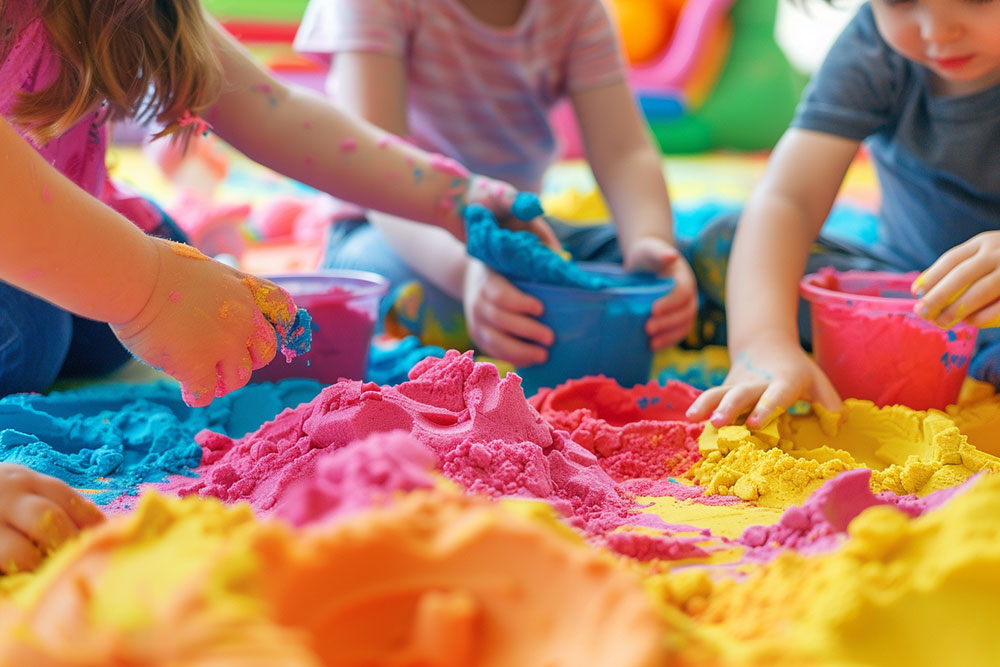
As parents, we always look for the best toys to stimulate our children’s creativity and development. Two popular options that often come up are Magic Sand and Kinetic Sand. Both promise hours of fun, but which one is better for your kids? In this article, we’ll explore the differences between Magic Sand and Kinetic Sand, their benefits, and which one might be the better choice for your children.
Magic Sand, also known as hydrophobic sand, is a type of sand coated with a special compound that makes it repel water. Originally developed to clean up oil spills, Magic Sand has become a popular sensory play material for children. It feels like regular sand but can be molded and shaped without getting wet.
The concept behind Magic Sand’s water-repellent properties was initially intended for environmental purposes. Scientists sought to create a substance that could clean up oil spills by repelling water and attracting oil. While this application was largely experimental, the unique characteristics of Magic Sand found a more permanent home in the realm of educational toys.
Kinetic Sand, on the other hand, is regular sand coated with silicone oil, giving it a unique, moldable texture. This coating prevents the sand from drying out, making it perfect for endless play without the mess of traditional sand.
Kinetic Sand is particularly noted for its sensory benefits. The tactile experience of squeezing and molding Kinetic Sand can be incredibly soothing and is often used in therapeutic settings for children with sensory processing disorders. The continuous movement and shape-shifting properties of the sand can help improve fine motor skills and provide a calming sensory experience.

Magic Sand has a dry, grainy texture that repels water, making it feel like dry sand even when submerged. This makes it a fascinating material for children to explore, as it defies their expectations of how sand typically interacts with water. Kinetic Sand, in contrast, has a soft, dough-like texture that is soothing to touch and easy to mold. The unique feel of Kinetic Sand makes it highly engaging for children, encouraging them to explore and experiment.
Magic Sand can be used in a variety of ways, including underwater. Its hydrophobic properties make it ideal for creating underwater sculptures and learning about the principles of hydrophobicity. Kinetic Sand is best for dry play, with its sticky nature making it perfect for building detailed structures and shapes. Children can create intricate castles, animals, and other figures, enhancing their creativity and spatial awareness.
Both types of sand are easy to clean, but Kinetic Sand has an edge as it sticks to itself, reducing mess. Magic Sand can scatter easily and might require a bit more effort to tidy up. However, both sands are non-staining and easy to vacuum or sweep up, making them suitable for indoor play.
Both Magic Sand and Kinetic Sand offer educational benefits. Magic Sand is excellent for teaching kids about water-repellent materials and science concepts, such as hydrophobicity and the behavior of materials in different environments. Kinetic Sand helps with fine motor skills, hand-eye coordination, and creativity. The tactile nature of Kinetic Sand can also be beneficial for children with sensory processing issues, providing a soothing and engaging experience.
Safety is a primary concern for parents, and both types of sand are designed to be safe for children. Magic Sand is non-toxic and hypoallergenic, making it suitable for children with sensitivities. Kinetic Sand is also non-toxic and hypoallergenic, with the added benefit of being easy to clean up, reducing the risk of ingestion or inhalation.

Pros:
Cons:
Pros:
Cons:
When deciding between Magic Sand and Kinetic Sand, consider your child’s interests and the type of play experience you want to provide. If your child is fascinated by water and enjoys science experiments, Magic Sand is a great choice. For children who love to build and create, Kinetic Sand offers endless possibilities.
To minimize mess, set up a designated play area for sand activities. Use a large tray or container to contain the sand and make cleanup easier. Encourage your child to keep the sand within the designated area to prevent scattering.
Both types of sand can be used in educational activities. For Magic Sand, create experiments that demonstrate its hydrophobic properties. For Kinetic Sand, set up building challenges to enhance fine motor skills and creativity.
While both sands are safe for children, supervision is important to ensure they use the sand appropriately. Keep an eye on younger children to prevent them from putting the sand in their mouths. Encourage older children to explore and experiment safely.

The choice between Magic Sand and Kinetic Sand depends on your child’s preferences and the type of play experience you want to provide. If your child loves experimenting with water and learning about science, Magic Sand is an excellent choice. For those who enjoy molding, shaping, and creating detailed structures, Kinetic Sand is the way to go.
Many parents have shared positive feedback about both types of sand. One parent mentioned, “My kids love Magic Sand! They spend hours creating underwater scenes and learning about how it works.” Another parent shared, “Kinetic Sand is a lifesaver. It’s easy to clean up, and my children enjoy building all sorts of shapes and structures.”
Experts in child development also highlight the benefits of both sands. Dr. Emily White, a pediatric occupational therapist, notes, “Magic Sand offers a unique way for children to engage in sensory play and learn about science concepts. Kinetic Sand, with its soothing texture, is excellent for fine motor development and provides a calming sensory experience.”
Magic Sand and Kinetic Sand each offer unique benefits and play experiences for children. Understanding the differences can help you make an informed decision about which one is best for your kids. Whichever you choose, both types of sand will provide hours of fun and educational play.
For more information on our Magic Sand products and services, check out our What is Magic Sand page or explore our OEM Magic Sand Service. If you have any questions or need a quote, feel free to contact us.
For any questions or quotes about our Sensory Sands!